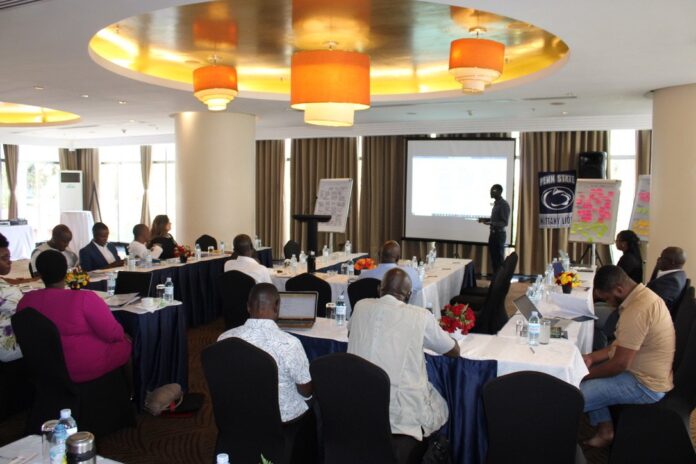Africa is home to some of the most abundant and important wildlife populations on the planet, boasting a significant portion of the planet’s tropical biodiversity. However, the increased scarcity of natural resources as a consequence of climate change, and the urbanisation due to a growing human population both contribute to the progressive encroachment of wildlife into human-inhabited zones. Consequently, the persisting problem of human-wildlife conflicts poses a substantial threat to wildlife conservation efforts. The strained relationship between Indigenous people and local communities and wildlife, coupled with conflicts involving conservation organizations, has resulted in alarming levels of biodiversity loss in African ecosystems. Despite existing research and mitigation policies, governmental wildlife conservation institutions in Africa have a limited understanding of the causes (which are also changing and dynamic), and consequences of wildlife conflicts as well as what the most effective solutions could be.
The proposed Research Network is designed to address this pressing issue by establishing a prominent scientific research and knowledge platform comprising all stakeholders involved in wildlife conflicts in Africa. This inclusive network encompasses academia, government bodies, non-governmental organizations, private sector organisations, and community groups. In this way, the Network aims to enhance access to research findings on human-wildlife conflicts, increase the visibility of African researchers involved in this field, and empower them to advocate for human-wildlife conflict policies at local and continental level. One of the primary objectives of our Research Network is to create a centralized online repository that consolidates information on human-wildlife conflict issues in Africa. In addition, an online communication platform will be established to facilitate the timely exchange of information among stakeholders. Moreover, the network is set to provide a dedicated forum for experts and stakeholders to engage in focused discussions regarding human-wildlife conflicts. In this way, the Research Network aims to bridge the gap between academic research and wildlife management efforts in Africa, thereby fostering better coexistence between humans and wildlife.
About the HWCRN
The HWCRN is led by a team of African scholars from top-tier research universities in the United States (Oregon State University, Pennsylvania State University and the University of Vermont) and East Africa (Makerere University in Uganda, Moi University in Kenya, and Sokoine University of Agriculture in Tanzania) and Shared Planet (a stakeholder engagement consultancy based in London). We envision this Network as a leading platform for stakeholders involved in wildlife conflicts across the continent, including academics, government officials, nongovernmental and private organizations, and community organizations. It will facilitate greater accessibility to human-wildlife conflict research outcomes, enhance the visibility of African researchers addressing wildlife conflicts, and enable them to advocate for effective human-wildlife coexistence policies in Africa.
The HWCRN mission
The Network aims to enhance human-wildlife coexistence in Africa through the following objectives:
1. Foster trust and collaboration between wildlife practitioners and the scientific community by sharing knowledge and expertise with wildlife managers.
2. Empower and incorporate local community perspectives, needs, and voices into human-wildlife conflict policies and practices, through engagement, exchange, co-creation approaches.
3. Improve the quality of human-wildlife co-existence policymaking by providing governments with context situated and place-based insights and access to various scientific experts.
4. Enhance the capacity of frontline practitioners by providing easy access to the latest academic research findings and recommendations.
HWCRN core activities
The HWCRN will undertake various activities to foster collaboration and transform human-wildlife conflict management in Africa. These activities include:
1. Creating a research repository of relevant research: Establish an online-based platform for researchers and practitioners in Africa, enabling access to emerging human-wildlife relationships research insights.
2. Translating scientific findings into practical tools: Delivering timely, research-based information on human-wildlife relationships to national wildlife agencies, national parks, and park managers, providing them with actionable insights.
3. Connecting wildlife management practitioners with academic experts: Establishing a real-time connection between wildlife managers and academic experts/scholars working on human-wildlife relationships, enabling park managers to seek immediate expert advice and discuss emerging conflict issues that can be further explored through research.
4. Building a community: Bringing together African scholars, communities, wildlife practitioners, governments, NGOs, and other stakeholders involved in human-wildlife relationships to foster a cohesive African community dedicated to addressing human-wildlife co-existence challenges in Africa.
HWCRN Quotes
“The HWCRN’s primary mission is to serve as a strategic platform for coordination and collaboration. We believe that by leveraging the collective strength of all stakeholders involved in human-wildlife relationships, we can achieve our common goal of sustainable development and wildlife conservation in Eastern Africa.”
– Dr. Edwin Sabuhoro, Assistant Professor of Recreation, Park and Tourism Management and African Studies at the Pennsylvania State University.
“Establishing our Research Network signifies a pivotal step towards harmonious human-wildlife coexistence in Africa. By uniting wildlife practitioners, academics, and local communities, we not only foster trust and collaboration but also empower frontline practitioners with science-driven policy solutions, bridging academia and practice gaps and ensuring that local perspectives informed science is accessible to policymakers and guides impactful policymaking and ultimately enhances the well-being of both people and wildlife.”
– Dr. Ian E. Mananura, Associate Professor of Forest Ecosystems & Society at the Oregon State University
“The HWCRN’s website will be an important tool for our work. I am particularly excited about the website’s Knowledge Hub section, which serves as a unique repository of research publications, policies, and other documentation on human-wildlife conflicts that are relevant not only to the Eastern African context but also to the rest of the continent. I believe this platform can become a leading resource for researchers and practitioners addressing this critical issue of biodiversity conservation and human development in Africa, enabling greater accessibility to existing and emerging research insights.”
– Dr. Ida Nadia S. Djenontin, Assistant Professor of Human-Environment Geography at the Pennsylvania State University
“The HWCRN offers a valuable tool to support the Uganda Wildlife Authority’s work in engaging with local communities and other stakeholders to conserve, economically develop, and sustainably manage Uganda’s wildlife and protected areas. Through our work with the HWCRN, the Uganda Wildlife Authority can strengthen these collaborative relationships, sharing our on-the-ground expertise while learning from others.”
– Ms. Sharon Kamuganga Kagwisa, Reservations Officer at the Uganda Wildlife Authority (UWA)
“Encouraging knowledge sharing means establishing a lasting working relationship between academia and the different actors involved in wildlife management at all levels. This will enable park managers, for instance, to access immediate expert advice to address new and emerging HWC issues more effectively.”
– Dr. Jim Ayorekire, Senior Lecturer of Tourism Planning and Management at Makerere University.
















 The African Research (AR) Index is a comprehensive scholarly directory and database focused explicitly on journal publishers that publish and disseminate African research.
The African Research (AR) Index is a comprehensive scholarly directory and database focused explicitly on journal publishers that publish and disseminate African research.

